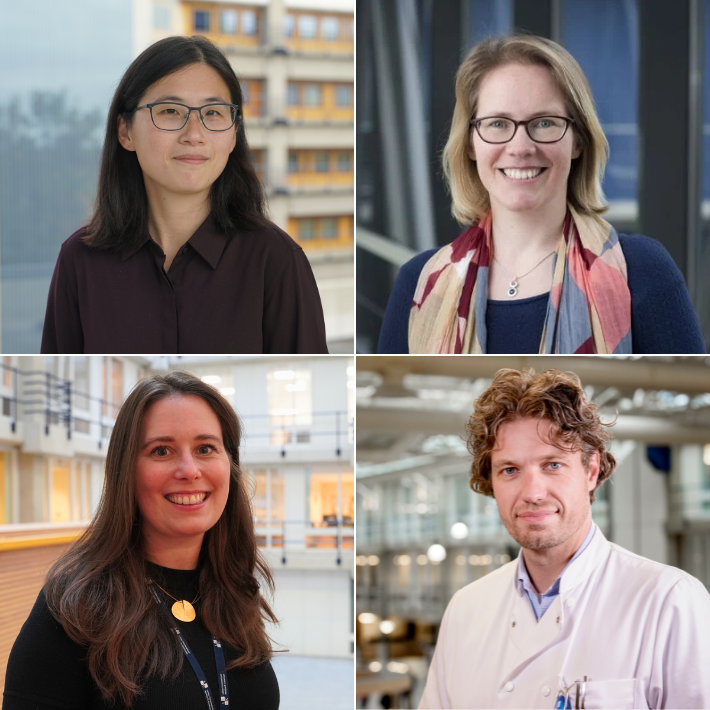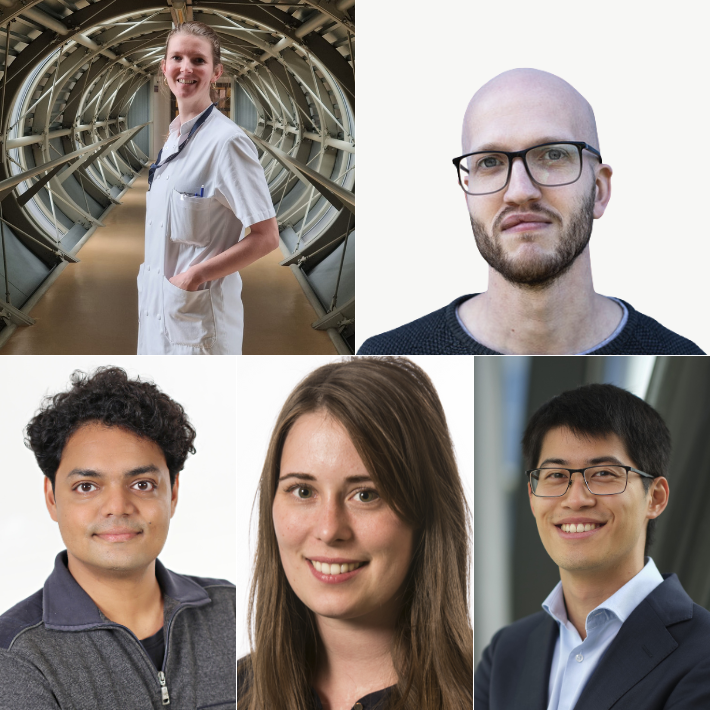The domain of health research and medical sciences is managed by ZonMw.
Four talented LUMC researchers receive prestigious Vidi grant
23 October 2025
reading time
Four talented LUMC researchers have received a prestigious Vidi grant from the Dutch Research Council (NWO). The recipients are: Nan van Geloven, Lydiane Hirschler, Joost Vermaat, and Annie Yang. In this article, you can read about how they plan to use their grants.
Annie Yang and Nan van Geloven. Lydiane Hirschler and Joost Vermaat.
&width=710&height=710)
The Vidi grant is part of NWO’s Talent Programme Veni Vidi Vici, which awards the Vidi to researchers who have already conducted several years of postdoctoral research. With funding of up to €850,000, Vidi laureates can further develop their own line of research and build their own research group. This year, 149 Vidi grants were awarded.
The impact of AI prediction models in healthcare
The Vidi project of biostatistician Nan van Geloven (Medical Statistics) focuses on assessing the impact of AI prediction models in healthcare. Currently, such models are mostly evaluated based on their predictive accuracy. Van Geloven aims to develop new data analysis methods that go beyond that. Do a model’s predictions actually lead to better treatment choices—and therefore to improved patient outcomes?
Using techniques for causal inference, the new methods will be able to answer this question based on patient data collected before a predictive model is implemented. This approach allows researchers to identify, at an early stage, which models are most promising for real-world use—and which are not.
How the brain cleans up its waste
A well-functioning waste removal system is crucial for a healthy brain. When this cleaning process is disrupted, waste products can accumulate and contribute to conditions such as dementia. Yet, little is known about exactly how the brain clears its waste.
In the Go-with-the-flow project, Lydiane Hirschler (Radiology) investigates the pathways through which cerebrospinal fluid—the liquid that helps cleanse the brain—flows through the brain. By mapping these routes and their underlying mechanisms in detail, examining whether they are influenced by physiological stimuli, and studying the roles of sleep and aging, Go-with-the-flow aims to deepen our understanding of how the brain keeps itself clean.
Research into personalized lymphoma treatment
Lymphomas can develop in almost any organ, yet current treatments take little account of these organ-specific differences. In his project “Anatomy Matters!”, Joost Vermaat (Hematology) seeks to understand how these differences affect the effectiveness of immunotherapies—and how this knowledge can lead to more personalized treatment strategies.
Using artificial intelligence, his team is developing ORACLE, a tool that integrates data on genes, the immune system, and cells. This model will help physicians tailor therapies to the biological characteristics of each patient, improving survival rates among high-risk patients. According to Vermaat, this Vidi grant is a great boost for translating insights into lymphoma biology to clinical practice.
Zooming in on the liver in the fight against malaria
Malaria is a deadly mosquito-borne disease that primarily affects young children. The parasite first infects the liver, where a single cell can produce tens of thousands of blood-infecting parasites within seven days. This liver stage is a critical target for therapies, as blocking it can prevent both disease in individuals and transmission within the community.
In this project, Annie Yang (LUCID) and her colleagues—working with the Department of Surgery (Sven Mieog, Stijn van Laarhoven, and Henk Hartgrink)—study the “imprints” left by infected cells on surrounding liver cells, using anonymized residual liver tissue from surgeries. Their goal is to understand the role of these imprints in the immune response to repeated infections, which could lead to new therapies targeting liver-stage infections.

&width=710&height=710)
&width=710&height=710)